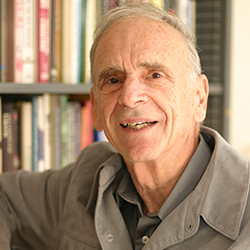Burton A. Weisbrod Ph.D.
 John Evans Professor of Economics
John Evans Professor of Economics
Chair of the Program on Performance Measurement and Rewards
Department of Economics, Institute for Policy Research
Northwestern University
Email: b-weisbrod@northwestern.edu
Discipline: Economics
Expertise: Organization of Care
Investigator Award 
Nonprofit, For-Profit, and Governmental Provision of Health Care: Does Institutional Form Matter?Award Year: 2000 Health care services in the U.S. are provided by an amalgam of for-profit, nonprofit, and governmental institutions. Dr. Weisbrod's project examines whether and, if so, how institutional form matters in health care delivery and what it suggests for improved policymaking. Building on his and other's earlier work, he explores the fundamental question of what nonprofit and governmental organizations contribute to health care that is not provided by the private sector. He focuses on the problems of rewarding organizational performance in forms that, while socially valuable, are privately unprofitable. He also explores difficulties that private enterprise confronts when outputs are complex and costly to measure. Differences in institutional behavior will be examined in a variety of service delivery settings. The results should shed light on the policy debate about the organization of the health care system and the desired balance between private, nonprofit, and governmental providers.
Background 
Dr. Burton Weisbrod is the John Evans Professor of Economics and chair of the Institute for Policy Research's Program on Performance Measurement and Rewards at Northwestern University. He has written or edited 15 books and nearly 200 articles and papers on the economics and public policy analysis of nonprofit organizations, education, health, the causes and consequences of research and technological change in health care, poverty, manpower, public interest law, the military draft, and benefit-cost evaluation. His most recent research examines the comparative economic behavior of for-profit, government, and private nonprofit organizations, and the causes and consequences of the growing commercialism of nonprofits. Dr. Weisbrod served as a senior staff economist on the Council of Economic Advisors to presidents John F. Kennedy and Lyndon B. Johnson. He consults widely for governments, foundations, nonprofit organizations, and private firms in the United States and abroad. From 1990 to 1995, Dr. Weisbrod served as director of Northwestern University's Institute for Policy Research (IPR), then known as the Center for Urban Affairs and Policy Research. At the University of Wisconsin-Madison, where he spent 26 years on the economics faculty before coming to Northwestern, he founded and directed the Center for Health Economics and Law and co-founded and directed the Training Program in Health and Mental Health Economics, supported by the National Institute of Mental Health. His elected positions include membership in the Institute of Medicine, National Academy of Sciences, fellow of the American Association for the Advancement of Science, in addition to being elected to its Governing Council for the 1998-2000 term, Executive Committee of the American Economic Association, and president of the Midwest Economics Association. Weisbrod was appointed by then-Secretary of Health and Human Services Donna Shalala to the National Advisory Research Resources Council of the National Institutes for Health for a four-year term from 1999 to 2003. From 2000 to 2005, Weisbrod was chair of the Social Science Research Council (SSRC) Committee overseeing its program on Philanthropy and the Nonprofit Sector; from 2002 to 2005 he was a member of the National Academy of Sciences Panel on the Measurement of Nonmarket Activity, and in 2005 he became a member of the new IRS User Group Advisory Committee. Other honors include being recipient of the Lifetime Distinguished Research Award from the Association for Research on Nonprofit Organizations and Voluntary Action (ARNOVA) in 1997, being named Phi Beta Kappa Visiting Scholar for the 1998-9 academic year, and receiving, in 1993, the Carl Taube award from the American Public Health Association for his collaborative research on evaluation of community mental health programs.
- Lindrooth, R.C., Weisbrod, B.A. Do Religious Nonprofit and For-Profit Organizations Respond Differently to Finanical Incentives? The Hospice Industry. J of Health Economics, 2007, 26(2): 342-57.
- Steinberg, R., Weisbrod, B.A. Nonprofits with Distributional Objectives: Price Discrimination and Corner Solutions. J of Public Economics, 2005, 89(11-12): 2205-30.
- Ballou, J.P., Weisbrod, B.A. Managerial Rewards and the Behavior of For-Profit, Governmental, and Nonprofit Organizations: Evidence from the Hospital Industry. J of Public Economics, 2003, 87(9-10): 1895-1920.
- Segal, L.M., Weisbrod, B.A. Volunteer Labor Sorting across Industries. J of Policy Analysis and Management, 2002, 21(3): 427-47.
